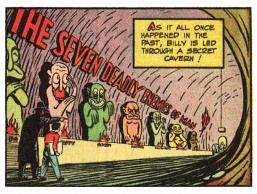“Live by the sword, die by the sword.”
“Play with fire and you might get burned.”
Those are lines that sprung to my mind as I read this FT article noting how Google’s support for ‘net neutrality regulation has transmogrified into a push for “search neutrality.” Such regulation would be aimed directly at Google’s heart throat nuts business model.
(I was the first to discuss “search neutrality” here on TLF. Ignore Adam’s comment.)
But sloganeering is cheap. Let’s take a minute to try and understand why things like this happen to companies like Google.
First, I think, most executives—certainly executives in tech companies—don’t understand Washington at all. They have a gauzy impression that good people work for the betterment of public policy here.
Actually, that’s true. Just about everyone is good. And everyone is working for the betterment of public policy as they see it. The thing is, everybody sees the betterment of public policy as turning it to their own interests. Washington, D.C. is a war of all against all—each trying to grab the most stuff—using politics instead of clubs, knives, and guns.
Next, I think it’s important to recognize the incentives of the people who advise tech executives. They are people with families and mortgages. They want to have and keep a job. So what do they do? They encourage involvement in public policy. The public policy advisor who says “steer clear of Washington” may be giving better advice, but his consulting contract is small and its term is short.
The government relations/lobbying shop in a company like Google is part of a larger business, yes, but it is a small bureaucracy within the business. It doesn’t produce anything subject to competitive pricing, so (accounting practices notwithstanding) there is little way to measure its value. The fallback measure is activity—the more things happening, the more ‘valuable’ the lobbying shop. (Surprise me, Google, so famous for measurement, testing, and rigor in product development. Have you got a way to measure the true value produced by your lobbying shop, law department, accounting group, etc.?)
You see how the dynamics quickly get perverse. A public policy advisor or lobbyist makes him- or herself ‘valuable’ by getting the client into trouble.
Google is not in trouble. The FT story is premature, and it’s overstatement to say that Google has been “hoisted by its own petard.”
But imagine a controlled experiment in which another Google in a parallel universe didn’t draw attention to itself in Washington, D.C., didn’t push for conditions in the 700 MHz spectrum auction, didn’t advocate for ‘net neutrality regulation, and so on. That Google might not have created—or might have delayed—the need for a permanent lobbying/government relations cost center.




 The Technology Liberation Front is the tech policy blog dedicated to keeping politicians' hands off the 'net and everything else related to technology.
The Technology Liberation Front is the tech policy blog dedicated to keeping politicians' hands off the 'net and everything else related to technology.